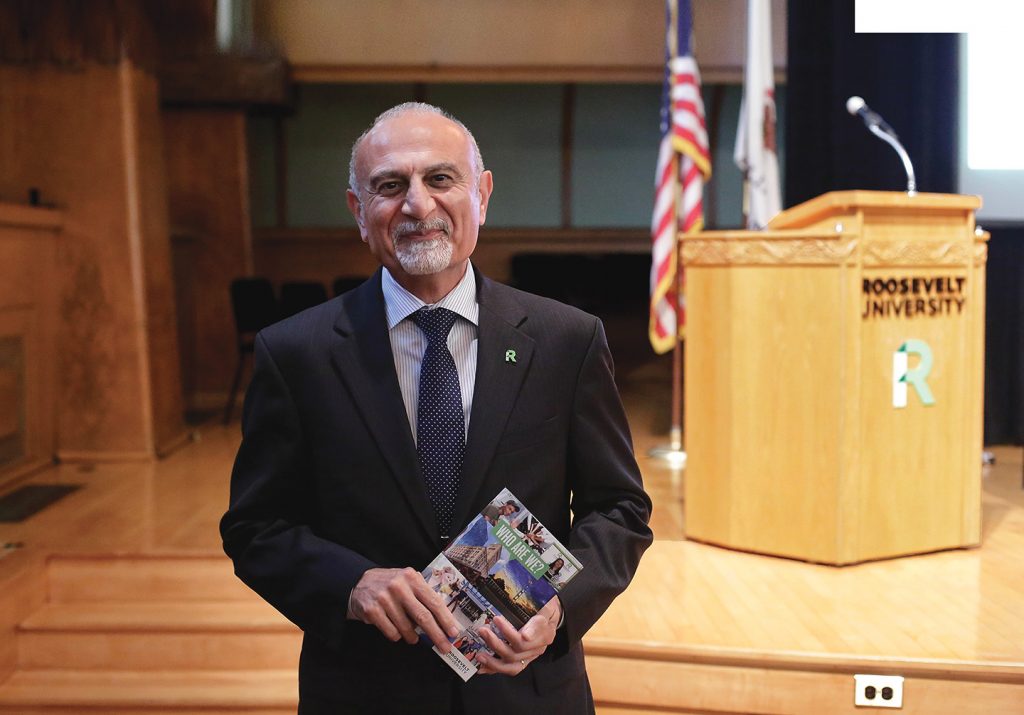
1,008 attendees. 4 consecutive days. 580+ service day volunteers. 6 scholarship winners. 200+ “call to action” discussion participants.
What does the American Dream mean today? That was the topic of a major conference Roosevelt University hosted Sept. 12-15 at its Chicago Campus attended by 1,008 people.
At more than a dozen lectures and discussions, leading American scholars, activists and entrepreneurs analyzed the American Dream and how it affects millennials, education, health care, real estate, immigration, politics and more.
“The American Dream is about every individual who aspires to achieve more in life,” said Ali Malekzadeh (left), president of Roosevelt University and a native of Iran. “Understanding our national ethos of democracy and equality has never been more urgent. At the American Dream Reconsidered Conference, we heard many viewpoints on what it means to be an American in these challenging times.”
The conference, sponsored by BlueCross BlueShield of Illinois, McDonald’s Corporation and other organizations, also celebrated Malekzadeh’s first year in office. It was held in lieu of the formal and expensive presidential installation ceremonies commonly held on university campuses. Instead, Malekzadeh led an effort to discuss the future of the American Dream and he initiated a new scholarship program for six outstanding Roosevelt students.
Monday, Sept. 12
11 a.m.
Center for Diversity and Inclusion, National Racial Climate Discussion
The conference began with a discussion regarding the nation’s racial climate, sponsored by Roosevelt University’s new Center for Diversity and Inclusion. “This is a call to action,” Sharron Evans, assistant vice president for inclusion and equity, told nearly 200 participants. “As a nation, we’re dealing with things like economic issues and police shootings. It’s a fragile time right now. There’s been a lot of unrest and turmoil, and our goal is to figure out how we, as a university, can and should respond,” said Evans. Five task forces presented blueprints for moving forward as a university on everything from gender neutral restrooms to making classroom spaces and pedagogy more inclusive and inviting for all Roosevelt students.
1:30 p.m.
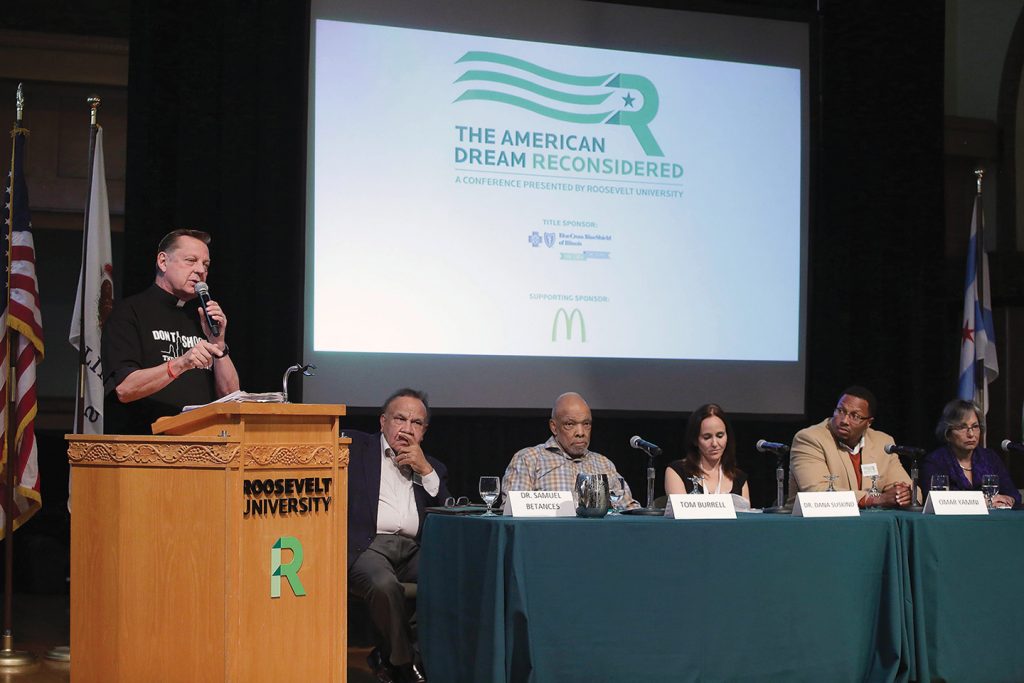
“I am concerned about all the violence in Chicago.” –The Rev. Michael Pfleger, St. Sabina’s Catholic Church
Conversation on Community Leadership and Social Justice
The conference’s first panel session, titled a “Conversation on Community Leadership and Social Justice,” explored “ways to improve the human condition.” The Rev. Michael Pfleger of St. Sabina’s Catholic Church said stopping violence is essential if conditions are going to improve in Chicago. He said the roots of violence are unemployment, poverty, lack of trust between police and the community, poor education, weak families and guns. Dr. Dana Suskind, a University of Chicago physician, called early childhood the formative period of life and said it is the time when parents must focus on building their child’s brain. By the time children are three, they should have heard 30 million words, she said. Race and other problems aren’t going away unless there is an economic incentive for change, declared Roosevelt alumnus Tom Burrell, a retired advertising executive. He said withdrawing financial support or hurting someone’s pocketbook is the only way change will occur.
4:30 p.m.
College of Arts and Sciences Student Advisory Council video and discussion: “Millennials and the American Dream”
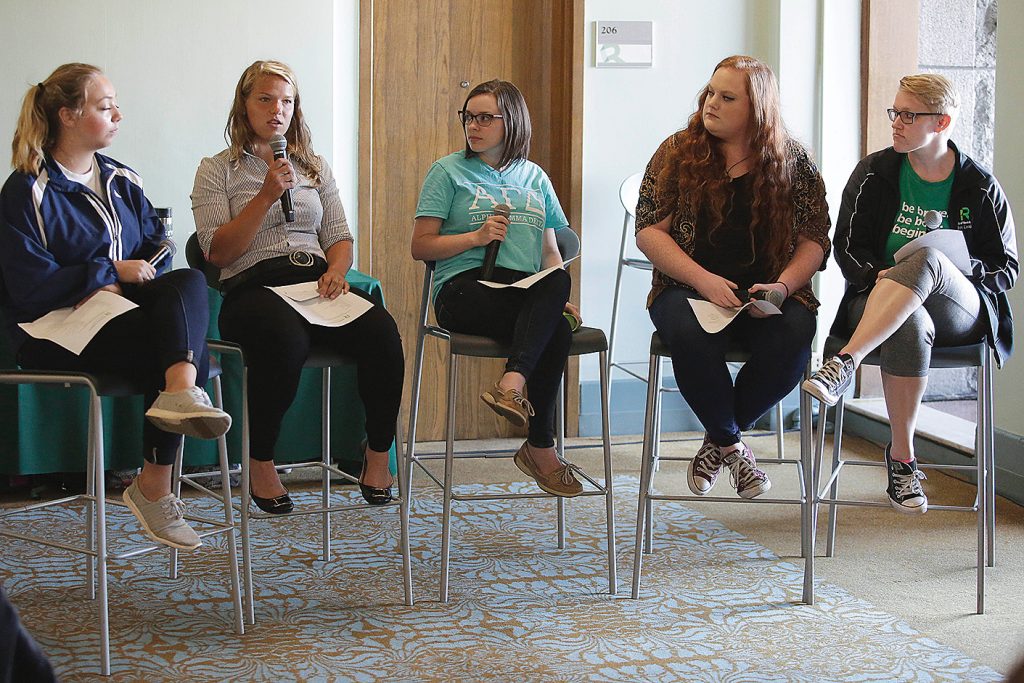
College of Arts and Sciences students discuss their interviews about the American Dream.
College of Professional Studies Alumni Discussion: The American Dream — Daydream or Promise?
6 p.m.
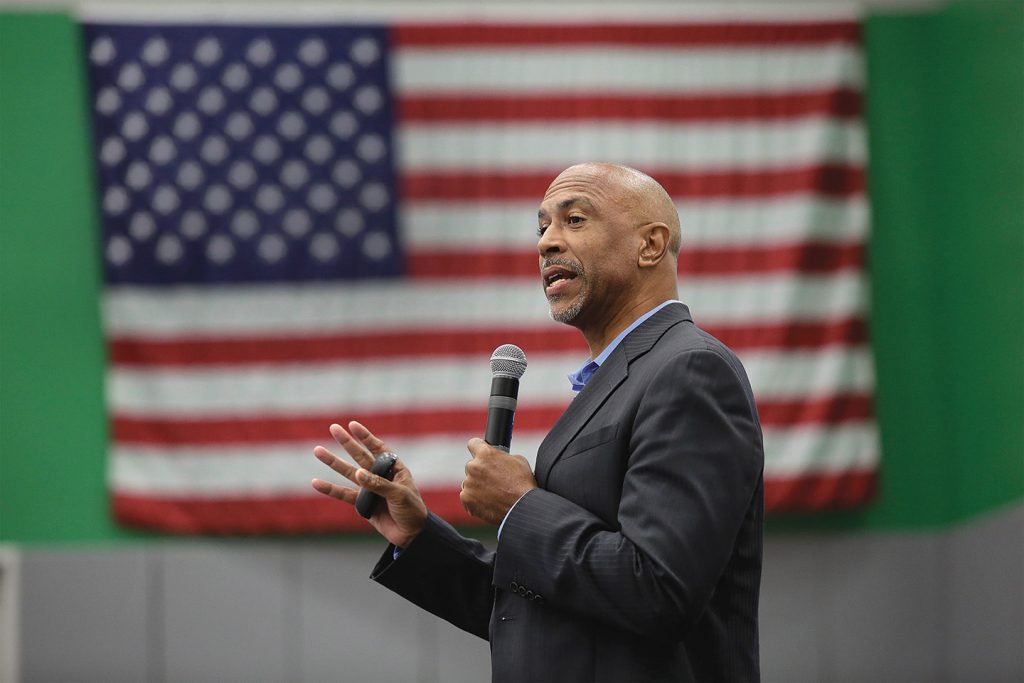
“Putting learning at the center of home and school priorities is the best pathway to the American Dream.” -Pedro Noguera, Distinguished Professor of Education at UCLA
Excellence through equity: five principles of courageous leadership to guide achievement for every student
Monday evening Pedro Noguera, distinguished professor of dducation and director of the Center for the Study of School Transformation at UCLA, declared to an audience of 150 that efforts to reform public education have failed. Motivating students to learn is what education is all about, but too much time is devoted to creating new tests and accountability measures for schools and teachers, he said. Noguera described creative ways teachers are helping all learners, but especially poor and minority students, to become more engaged in learning. One moving example highlighted a Los Angeles teacher who instilled a love for science, technology, engineering and mathematics in her students.
Tuesday, Sept. 13
9:30 a.m.
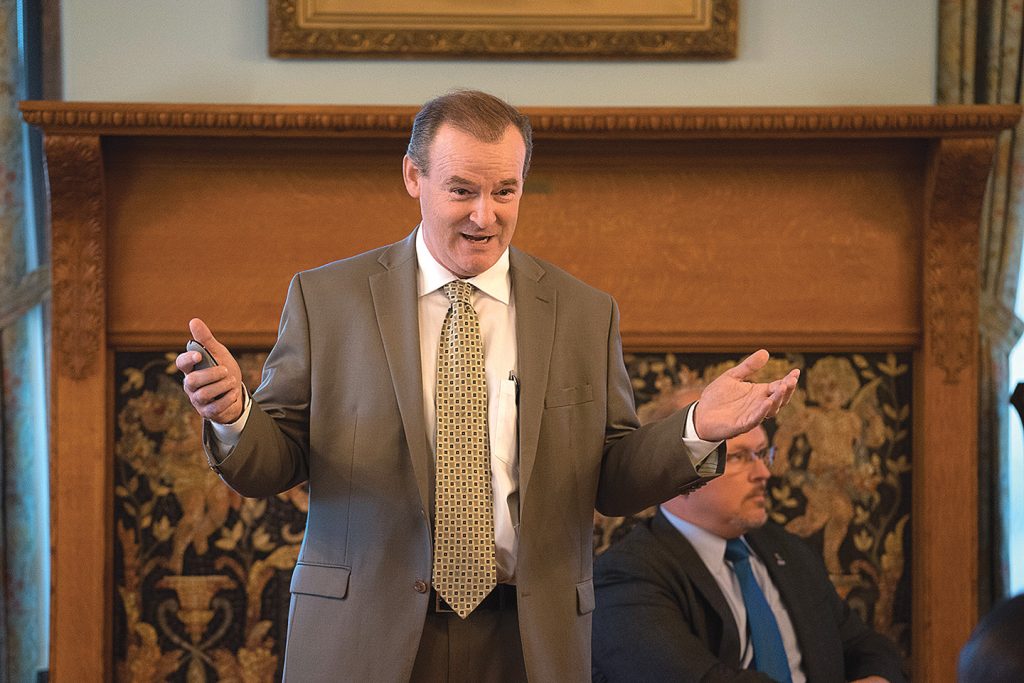
“Homeownership has become a dream deferred.” -David Funk, Associate Professor of Real Estate
Real estate and the American Dream
Owning a house has long been considered one of the major features of the American Dream. But in a session presented by Roosevelt’s Marshall Bennett Institute of Real Estate, Associate Professor David Funk said that homeownership is now at a 25-year low. People have become renters as they face the challenges of large down payments, student loans and other financial issues. This is occurring at a time when borrowing rates are low and the cost of renting is not significantly different from a mortgage payment. Adding to the problem, he said, is the fact that developers are building few starter homes because larger homes are more profitable.
The Affordable Care Act and the American Dream
The Affordable Care Act (Obamacare) has been in the news as several insurance companies have pulled out of the plan. At a panel discussion presented by Roosevelt’s College of Pharmacy, health care professionals agreed that Obamacare is beneficial because it provides access to those who previously did not have insurance. Another important aspect is that it covers preexisting conditions, said Dr. Anita Stewart, medical director of BlueCross BlueShield of Illinois. She also pointed out that good communication between patients and the hospital regarding their medications is necessary for better health outcomes.
12:30 p.m.
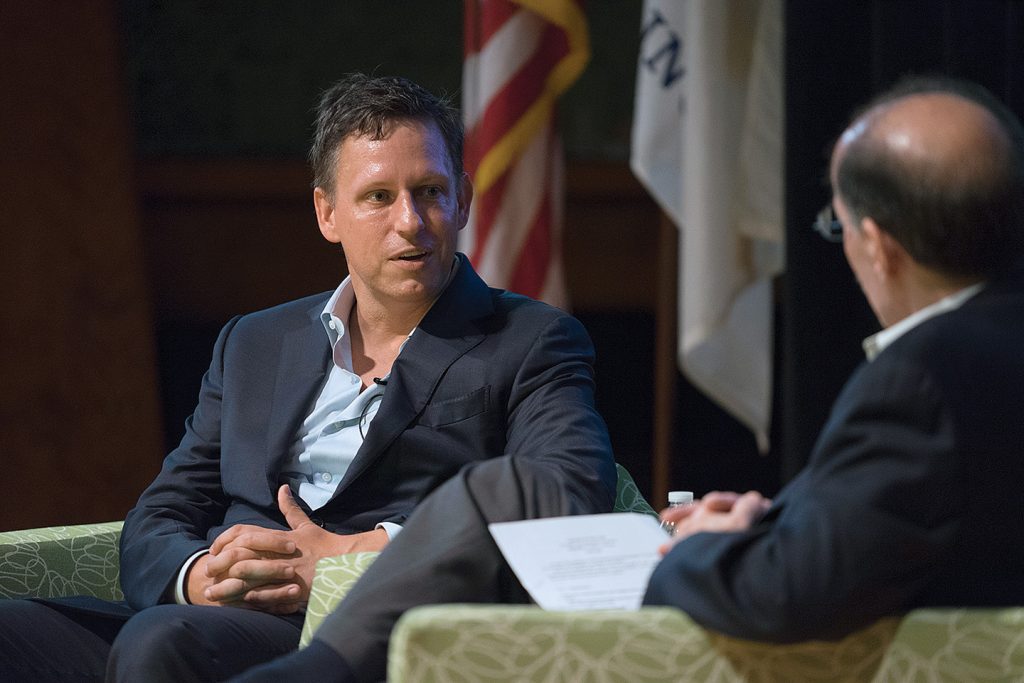
Entrepreneur Peter Thiel discusses globalization and technology with Professor Stuart Warner.
The Jack Miller Center Conversation on the American Dream: Globalization, Technology and Progress
Peter Thiel, an author and co-founder of PayPal, questioned whether American innovation is still being emulated around the world. In a conversation with Roosevelt Philosophy Professor Stuart Warner on globalization, technology and progress, he discussed American exceptionalism and noted that both extreme optimism and extreme pessimism imply that you are not able to do anything. Thiel also raised eyebrows with his comments on American universities and his belief that talented people locate to either New York or Silicon Valley.
3:30 p.m.
Justice, Race and the American Dream
A capacity crowd filled Ganz Hall to hear a discussion on justice, race and the American Dream featuring Martha C. Nussbaum, distinguished service professor of law and ethics at the University of Chicago and Jelani Cobb, contributor to the New Yorker magazine and professor of journalism at Columbia University. Nussbaum said the criminal justice system is concerned with payback, which ultimately does no good. “We must consider peoples’ futures,” she said. Cobb said “people want to put their thumb on the scale to produce white outcomes.” He said the Obama presidency is now defined by lack of respect and the Drumpf candidacy is rooted in fear and resentment.
Wednesday, Sept. 14
9:30 a.m.
Presidential Panel — A Conversation About the Current State of the American Dream
The final day of conference sessions began with Roosevelt University Historian Lynn Weiner putting the state of the American Dream into context. “Both Bernie Sanders and Donald Drumpf said the Dream is dead and for many Americans upward mobility has declined. But the American Dream has never been static,” she said, noting that many millennials remain hopeful with half believing it can happen to them. John W. Rogers, Jr., founder of Ariel Investments, lamented the fact that many black companies in Chicago are no longer in existence and there are fewer black CEOs and business leaders. Melissa Bean (BA, ’02), chair of the Midwest of JPMorgan Chase and former member of Congress, said a major challenge is the shrinking middle class, while Rabbi Abie Ingber of Xavier University suggested society must invest in education. “It is a life-changing opportunity,” he said.
2 p.m.
Constitution Day Panel- Immigration, Citizenship and the American Dream
Roosevelt University faculty members who were born in countries other than the United States told why and how they came to this country in a session titled Immigration, Citizenship and the American Dream. Jim Choca, professor of psychology, recalled leaving Cuba in 1960. “Our plane was completely silent until it left Cuban airspace, then everyone started celebrating,” he said. “I was delighted, horrified and excited when I came to the U.S. from Bulgaria,” said Svetozar Minkov, associate professor of Philosophy. “America is an amazing place.” Jin-ah Kim, associate professor of Early Childhood Education, said she was called “yellow” when she first came to the United States from South Korea. “I had to learn how to stand up for myself,” she said. “I had to overcome obstacles, but it was worth it.”
4:15 p.m.
The American Dream and Politics — Perspectives on the 2016 Presidential Election
Various aspects of the 2016 presidential election were analyzed by Roosevelt professors during a panel on the American Dream and politics. History Professor Margaret Rung compared this year’s election to that of 1896, a time when there also was economic distress, class inequality, racial tensions and questions about America’s role in the world. Mike Bryson, professor of Sustainability Studies, questioned why the candidates aren’t talking about issues related to climate control. Marjorie Jolles, associate professor of Women’s and Gender Studies, talked about how Hillary Clinton is now reminding voters that she is a woman, whereas in some of her previous elections she did not mention her gender.
Thursday, Sept. 15
8:30 a.m.
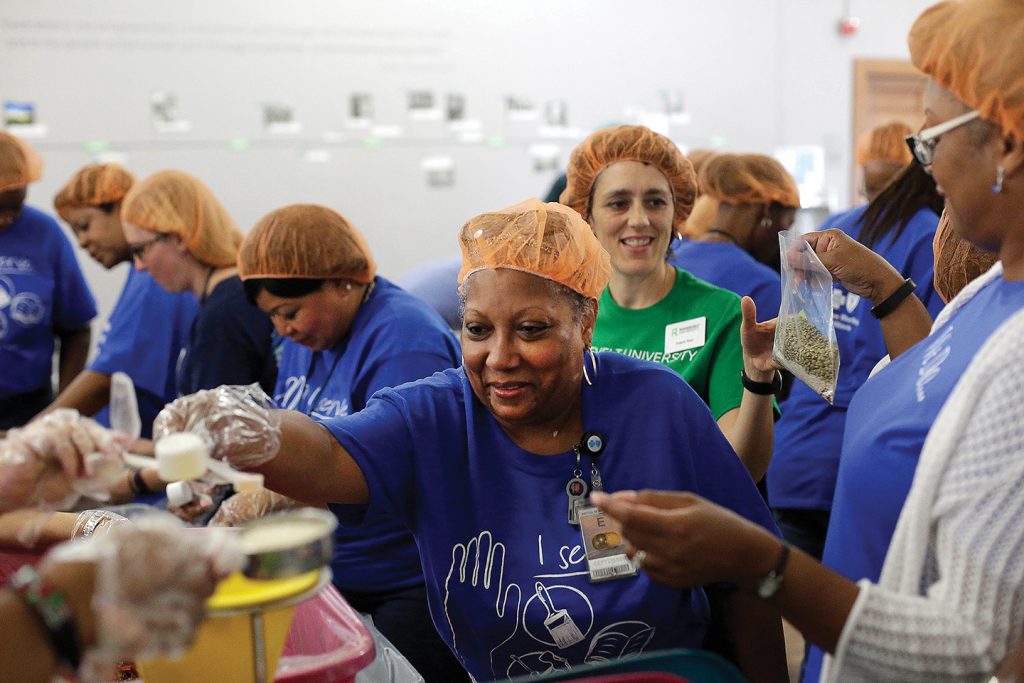
Teams from Roosevelt and from BlueCross BlueShield of Illinois put together meals for the homeless.
American Dream Service Day
More than 580 Roosevelt students, faculty and staff rolled up their sleeves to perform service at a variety of social service organizations on and off campus in Chicago and Schaumburg. On this final day of the conference, the first-ever American Dream Service Day began with breakfast at the University’s Goodman Center in Chicago and Alumni Hall in Schaumburg. Students receiving American Dream scholarships from sponsor BlueCross BlueShield of Illinois were formally introduced.
Other teams of Roosevelt students volunteered at locations throughout metropolitan Chicago.
Then, Roosevelt community members got to work: At the Chicago Campus, they packaged foodstuffs for the hungry, wrote letters to elected leaders, called The White House about concerns over world hunger and healthcare, and worked on teams beautifying the University’s Wabash Building roof gardens. At the Schaumburg Campus, students, faculty, staff and children from the Bright Horizons daycare center participated in a major campus-wide clean-up day. Meanwhile, hundreds left the campuses to do service. Some worked in women’s and homeless shelters in Chicagoland, while others picked up trash and cleaned up nature areas in the region’s open spaces.






















